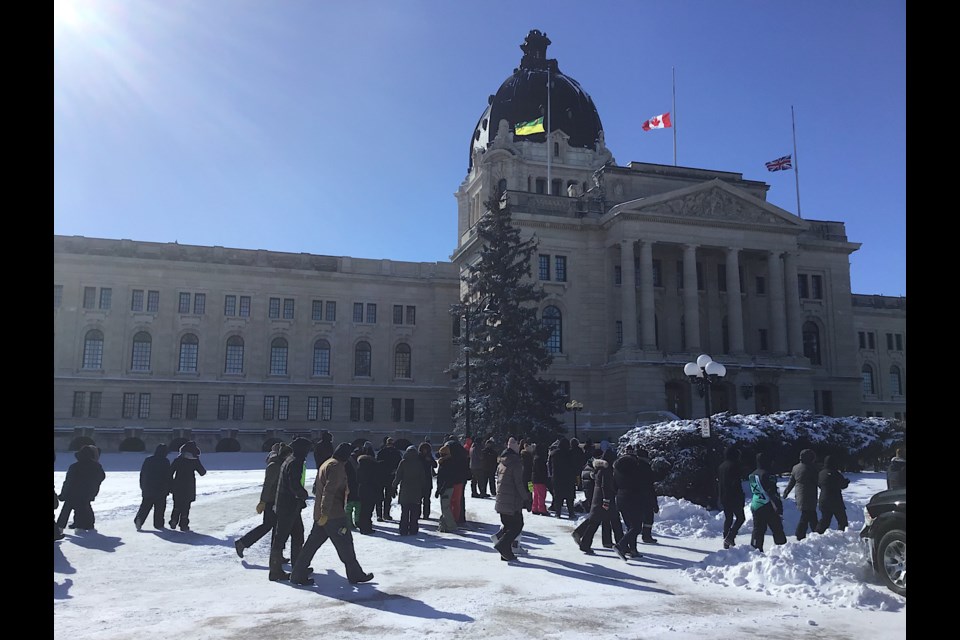REGINA - Cold temperatures as well as a picket line greeted the return of legislators to the Legislative Assembly Monday for the start of the spring sitting of the Saskatchewan Legislature.
The sitting — the final one expected before the province goes to the polls in a provincial election this fall — got under way with the cloud of a teachers’ strike hanging over the proceedings. The continuing rotating job action by Saskatchewan Teachers’ Federation was expected to be a prime issue as the Legislature returns this week.
Members of Saskatchewan Teachers’ Federation were on hand in front of the Legislature picketing on Monday. Teachers were on a rotating one day strike in Regina and a number of other schools divisions that day. New Democrat MLAs such as Education Critic Matt Love were seen on hand speaking to union members at that demonstration outside.
Not able to make it to the rally, due to weather conditions, was STF President Samantha Becotte. In a statement Becotte said the following: “We are very grateful for the number of teachers and supporters who were able to make it to the Legislative Building this morning as MLAs returned for the spring session. I also thank the striking teachers and supporters who are spending the day contacting government officials from other locations, since they couldn’t get to Regina safely after the snowstorm.
"The level of support we’ve seen is a sign to teachers across the province that Saskatchewan people share our goal of achieving long-term funding commitments that will improve the classroom experience for students. And it is a clear signal to government that we are united, we are supported and we are not backing down.”
Meanwhile, the governing Sask Party marked the return of the Legislature with an announcement at Young’s Equipment. Premier Scott Moe and Minister of Trade Jeremy Harrison announced the launch of the Saskatchewan Labour Market Strategy, described as their roadmap to secure a labour force keeping pace with growing demands and opportunities of the economy. The three main pillars of that strategy were to prepare Saskatchewan people for jobs, recognize skills in Saskatchewan, and international recruitment.
In speaking to reporters at that event, Premier Moe outlined the priorities of the government during the legislative session.
He said they would “continue to focus on the economic growth that we’re experiencing and have been experiencing for at least a decade and a half in Saskatchewan.” Moe also pointed to a focus on “what that economic strength can bring in the ways of investment.”
In particular, he pointed to government investment. Moe said there would be a record investment in health care this session, and that they would be “starting to see results from some of the investment that has been made since the pandemic in our Health Human Resources Action Plan.” He noted the surgical wait list has been reduced by 25 percent.
There are also plans for more investment in education. Premier Moe indicated that on the education issue there would be an announcement in the coming couple of days on investments the government would be making in the education sector, and “this government’s commitment to our students, our children and our educators in that sector.”
Moe also called on the STF to resume negotiations with the province.
“Again, we invite the union back to the table to ensure we can work on a strong and vibrant investment in education in the years to come.”
Meanwhile, in a statement Sask United Party leader Nadine Wilson called on the government and the teachers' union to resolve the labour dispute quickly.
“Our students deserve stability, quality education, and a nurturing environment," Wilson said. "The ongoing negotiations must prioritize their needs. We call upon Premier Scott Moe and the Saskatchewan Teachers Federation to find common ground swiftly. Our children’s education cannot be collateral damage.”







